- Home
- Robison Wells
Blackout b-1 Page 6
Blackout b-1 Read online
Page 6
But he wouldn’t turn her in. He couldn’t. He’d seen the look on her face when she’d confessed what she could do, that she had some kind of superpower. It wasn’t a look of guilt, like she’d been caught, and it wasn’t a look of shame, like she was admitting how poorly she’d treated him. It was a look of fear. Fear of what she could do. Fear of who she was.
He didn’t trust her. He didn’t know if he ever could. But he wasn’t going to turn her in.
She was Aubrey Parsons.
The bus pulled into the parking lot of North Sanpete High School, entering a hive of military activity. There were at least eight Humvees and two other buses. Tables were set up on the asphalt and soldiers sat at laptops. Others patrolled the perimeter with M-16s and night-vision goggles.
When their bus parked, an officer told Jack and Aubrey to stay where they were, and then he and all but one of the soldiers left the bus. The last man stood at the door, his focus more on what was going on in the parking lot than on the two teenagers he was guarding.
Aubrey was fidgeting in her seat. “These cuffs are digging in to me.”
“I know,” Jack answered with a nod.
“Where is everyone?” she asked, her voice a whisper so the guard at the front of the bus couldn’t hear.
“Maybe in the school?” Jack said.
“Maybe. But where are the other buses?”
He shrugged, and felt the awkward pain of his twisted arms. “Moved on to the next town? Ephraim or Manti? Mount Pleasant was probably an easy target because we were all at the dance. It’ll be harder to round up the other kids.”
All the more reason for offering a reward, Jack thought, though he wondered where that money was going to come from. There were a lot of kids, and he still doubted that most parents would give their kids up without a fight.
An idea struck him, and made him sick to his stomach. “What if they’re testing for something different? Something else besides what you’ve got—what you can do.”
“What do you mean?”
He made certain he was talking too quietly for the guard to hear. “There’re terrorists all over the country. And as of today they’re in Utah. What if something was put into our water supply, or our food? What if this has nothing to do with Nate or you? What if it’s a real virus?”
Aubrey let out a long slow breath and then smiled for the first time in hours. “I don’t know whether to be happy about that or horrified.”
Jack chuckled softly.
The guard stepped farther down the steps so he was looking outside.
“So how does it work?” Jack asked. “It’s not invisibility like in the comic books.”
She paused for several seconds and then spoke. “Here’s my best guess. I don’t think I’m actually changing—I don’t think my skin goes transparent or anything like that. I mean, my clothes disappear too, and people can’t hear me when I’m gone. I think, instead—and I know this is going to sound crazy—but I think that my brain talks to your brain and tells you I’m not there. So your brain just ignores any sign of me. Does that sound nuts?”
Jack thought it over for a moment. “Yes. But not any crazier than just turning invisible.”
She smiled again, and then leaned forward to try to take pressure off her bound hands.
“How long have you been able to do it?” he asked.
Aubrey was silent for several seconds, like she was trying to decide what to say. “About six months,” she finally answered. “It was in March. I’d been at a church activity and all of a sudden I couldn’t see.”
“Really?”
“Yeah. So, my leader drove me to the clinic and they were going to do tests, but my eyesight came back. I was sitting in an exam room and someone walked in, and I freaked out—I was just wearing one of those flimsy hospital gowns—and I realized they couldn’t see me. Something about wanting to be hidden made me just disappear.”
“That’s so weird.”
“Tell me about it.”
“How could you tell they couldn’t see you?”
“Because they just stood there and stared, and then started looking all around—in the bathroom, in the hallway—and they couldn’t hear me or see me. They were sure I’d just been there—they just couldn’t figure out where I’d gone. I finally reappeared, by accident. It took a long time to control it.”
“So the hospital knows?”
Aubrey looked instantly uncomfortable, turning to gaze out the window into the darkness. Jack wished he was back with the old Aubrey. They never used to have secrets.
He prodded. “Did they do tests?”
She slumped back in her seat, her weight on her bound hands again. “It wasn’t a doctor.”
“Your dad?” he asked.
“No.” She let out a long breath, and then laughed. “I was about to swear you to secrecy, but who are you going to tell? The army?”
Jack grinned. “If I could reach, I’d cross my heart.”
“Nicole,” Aubrey said. “Probably the best-kept secret in Mount Pleasant is that Nicole Samuelson, the queen bee of North Sanpete, has kidney failure. She’s on dialysis. She walked in thinking it was her room.”
“Seriously?”
She was getting fidgety again, like she’d just realized she’d told some enormous confidential secret.
“You can’t tell anyone,” Aubrey said, making eye contact for the first time since they’d sat down. “She’d kill me.”
Jack opened his mouth, but stopped himself. He carefully considered his words. He didn’t know how much of the old Aubrey was still there, but maybe it didn’t matter. They were tied up, on a bus to who-knows-where, captured by the military for some mysterious testing.
And besides, he’d wanted answers to this for a long time.
“That’s when you became Nicole’s friend,” he said.
“Yeah, you can call it that,” she said. She laughed again, but it was colder, more bitter. “We were never friends. Nicole asked the nurse if she could get her dialysis in that room, and of course they let her because she’s a Samuelson. So we shared it, and she talked to me. And she told me what she’d seen. I was freaking out, and I didn’t know what to say.”
Jack could imagine it all. That was the old Aubrey—the Aubrey Parsons who was too shy to talk during class at all, even though she knew every answer. She was probably as terrified of Nicole as she was of what was happening to her body.
“I didn’t become her friend,” Aubrey said. “I became her spy. In exchange, I got to hang out with her. She invited me to things. She—well, you know the rest.”
The idea made him mad, and he didn’t try to hide it. Aubrey never needed Nicole to make Jack like her. Honestly, Aubrey was prettier than Nicole. She wasn’t the Scandinavian bubbleheaded blonde that Nicole was—the bland generic beauty that the movies tried to convince him was gorgeous. Aubrey was tall, with long, straight brown hair and eyes that were a stark gray, eyes that reminded him of fresh snow on the mountains.
And honestly, he liked her better in jeans and a T-shirt than a fancy ball gown.
There was a noise at the front of the bus, and the soldier snapped to attention. On command, he hopped to the top step and took a clipboard from another man.
A voice shouted at a line of teens outside the bus. Jack strained to hear.
“. . . to take you to the testing and quarantine facilities. The rest of your classmates have already been moved there. You are the last batch from this county.”
“This county,” Jack repeated, but Aubrey hushed him.
“This will not take long, but it will require your participation. Congress has declared martial law. You kids know what that means? It means that we’re the police now. It means that if you have any problems, you will talk to us, and if you cause any problems, you’ll answer to us.”
There was a long pause. Someone was asking something. Aubrey whispered under her breath, but Jack didn’t catch it.
“Listen,” the soldier continued. “We
’re on your side. You’re American citizens and we’ll treat you with as much respect as our orders allow. We have kids of our own.”
Jack heard the response to that. “Then why are we in handcuffs?”
“All will be explained when we reach the quarantine area. I’m authorized to tell you two things. First, the virus that we’re testing for—it’s being spread by the terrorists. And second, all known terrorist subjects have been teenagers.”
Six more teens were on the bus now, though Jack didn’t know any of them. Four were from Manti, the town twenty miles to the south, and two others had managed to escape the shooting at the dance. Jack perked up when the seventh was called.
“Name and town?” the officer on the top step barked.
Matt looked terrified. He was the youngest of the group so far, small, thin, and drowned in his dirtied suit and tie. “Matt Ganza,” he said. “I’m from Mount Pleasant.”
“What school?”
“North Sanpete High. I’m sorry, I shouldn’t have left the dance. I’m really sorry.”
The officer ignored him, and flipped through a thick notebook. Finally, he held it up, comparing a picture to Matt’s face.
“Okay,” the officer said, and another soldier immediately grabbed Matt’s wrist and slipped a plastic bracelet onto it. He cinched it tight and Matt grimaced.
The officer ordered Matt to find a seat. His eyes met Jack’s, but he turned quickly and sat toward the front.
They moved to the next person in line—Nicole. The soldier helped her up much more gently than he’d done with Matt.
Aubrey stared for a moment and then looked down at her lap.
“Name?” the officer asked.
“Nicole Samuelson,” she said. She was still wearing her dress—a skimpy, shimmering thing that looked like it was made out of giant sequins. She was six feet tall normally, and in her heels she towered over the soldier.
How had she managed to escape the dance without a torn dress or broken stilettos?
The officer flipped through the notebook. “Also from North Sanpete?”
“Yes,” she said, smiling happily as though she was excited they were there. “Go Hawks!”
The man smirked. Jack couldn’t believe it. Nicole was flirting with the soldiers.
The other soldier attached her bracelet, so gently it almost looked loose on her wrist.
When she turned to walk down the aisle of the bus and saw Aubrey, Nicole’s face broke into a smile and she gave her a wink. She sat down next to Matt.
Four more students got on, all younger than Jack. They looked scared. Two were in their pajamas; they hadn’t been at the dance—someone had turned them in.
They were all prisoners now.
ELEVEN
LAURA SAT ON A WIDE flat stone, eating from a can of peaches while Dan washed in a cold creek.
The Eagle Canyon bridge had gone better than they could have hoped for. Dan was able to fracture the sandstone easily, and Laura even got a piece of the action, pulling shattered boulders away from the support struts. She knew Dan could move all the rock himself, but she liked being down there, rolling up her sleeves and doing something—anything—with her powers.
They’d loosened the rock around both bridges, enough that one of them began to creak and sway slightly before they’d made a run for it. Laura followed Alec’s orders and ran north out of the canyon rather than trying to climb the cliff face. She probably carried Dan five miles before rendezvousing with Alec and the truck. And, just before the truck doors closed, a loud rumbling roar echoed up the canyon. The bridge had fallen.
Then it was time for a real escape. They drove through the little town of Ferron, avoided another roadblock, and headed for the Manti-La Sal mountains. They needed somewhere to lie low, and they needed to get off the streets.
There was a reservoir directly above the town, and Alec spent half an hour talking about taking out that dam, too. But it could wait. They were leaving a big enough trail as it was.
After an hour on a narrow dirt road, they pulled off into the brush and set up camp in the dark. They each had a pup tent and sleeping bag in the back of the truck, and Laura was curled up in her bag, drifting off to sleep before the others had even staked their tents.
There was a bright light and the sound of an engine. It was loud and rattling, like an old utility truck.
Laura rolled over. She unzipped the tent about an inch so she could look out. A set of headlights shone through the trees.
As quietly as she could, Laura climbed out of the sleeping bag. This was her moment—it was her job to ensure the security of the whole team.
“Hey!”
The voice was young, female. Laura felt her heart sink a little—she wouldn’t even have to try.
A shape passed in front of the lights, and then another. There were two of them. They were just silhouettes, but one was taller than the other, with broader shoulders. Both had the wide-brimmed hats of forest rangers.
“Hello!” Alec called back with a wave.
As they moved out of the path of the beams Laura could see them better—a man and woman, both wearing green jackets and khaki pants. Neither looked much older than Laura or Alec. Probably fresh out of college. They had radios on their belts and other basic gear, but no weapons that she could distinguish.
Laura pulled on a sweatshirt, and wished she could change from her boxers to jeans without shaking the tent.
“How’s it going?” the woman asked.
“Great,” Alec answered, a smile in his voice. “Gorgeous night, isn’t it?”
Dan had opened his small daypack and was sitting on a rock, chomping on a granola bar, presumably so that he’d look too preoccupied to get into conversation.
“It is,” the woman answered, and moved her arm—she was checking her watch. “I saw your lights heading up the canyon. A little late to go camping?”
Alec reached into his back pocket and pulled out a folded map. “We heard about Lake Powell,” he said, his voice grave. “We just wanted to get away from everything.” He pointed to something on the map. The woman listened intently as he talked, commenting on a few of the landmarks and laughing at his jokes.
Laura knew enough about law enforcement, however, to know that something was wrong. The man wasn’t paying attention to Alec; he was staring at Dan, and Laura’s tent. His hand rested uneasily on his radio.
How long had they been watching? Had they seen the guns? Alec had the rifle, and Dan had the pistol. Either one might have been left out, unhidden when the forest rangers showed up.
The tent’s zipper was going to be too noisy. Laura pivoted to the back side of the tent. Gently, she plunged her utility knife into the nylon wall of the tent and slid it upward. In ten silent seconds, Laura’s tent was open.
There was no reason for Laura to hold back. The worst-case scenario was she’d charge one and the other would go for their radio. But people didn’t act like that. They wouldn’t go for their radio and stand there waiting to be attacked. They’d run. And Laura could outrun either one.
“Just so you guys know,” the woman said, “it’s a red burn season, so no campfires.”
Yeah right, Laura thought. The rangers wouldn’t follow them here at four in the morning to give them a friendly reminder about fires.
Dan pointed toward Laura’s pack and talked with a mouth full of granola. “We’ve been using one of the small backpacking stoves. The salesman in town said it was legal.”
“It is,” the man said, obviously still nervous. “One more thing—have you been watching the news?”
“Listening to the radio,” Alec said. “But the reception’s not very good up here. Why?”
“Well—” The man stopped himself, as though he didn’t know what to say. “I was just . . . curious.”
“Don’t worry,” Alec said, laughing. “We’re not supposed to be in school or anything. Laura and I are nineteen.” He pointed toward her tent. “Dan’s eighteen—just graduated in Ju
ne.”
“I’m sure everything is fine,” the woman said with a phony laugh. The man, more stilted, put the radio to his lips. “CC Eight, this is CC Station. CC Eight, this—”
Laura couldn’t wait any longer. She leapt from her hiding place, bounding across rocks with superhuman strength. It only took her two strides to reach the man and she brought her fist down hard on his hand, knocking the radio to the ground. She heard his bones break under her powerful blow. He stumbled and tripped on a root, falling on his back.
“Don’t move!” the woman shouted, her voice panicked. She’d yanked a canister of Mace from her belt, and she pointed it toward the group. With her other hand, she struggled to free the radio from its clip.
Dan was standing, his pistol leveled at the ranger.
“No, stop,” the woman said, pleading. “I don’t care who you are. I don’t think they should be locking people up, either.”
Laura still focused on the man, but her ears perked up.
“Drop the radio,” Alec said calmly.
She looked terrified. “Let him go!”
“Drop the radio,” Alec repeated, his voice quiet and cold. “I know you’re only a ranger, but allow me to explain something. The mace you’re holding is not going to stop a bullet.”
She was sweating despite the cool air, and her teeth were clenched as she looked back and forth between Dan and Alec.
“Drop—”
“Let him go,” she begged. “I won’t tell anyone you were here! Listen, I think what they’re doing is terrible. They took my little sister yesterday—I would love it if she could have escaped into the mountains like you.”
Alec paused for a moment. “Laura,” he finally said. Laura glanced at him and he pointed to the man on the ground in front of her. She smiled.
“Wait!” the woman shouted, but it was too late. In hardly a heartbeat, Laura yanked the man up by his crippled arm, then grabbed his collar and threw him backward through the night air. There was the sound of splintering trees and bones, and Alec refocused his attention on the woman.
She was crying now, and the mace fell from her fingers to the ground. Somewhere out of sight, the man was gasping his last breaths. Both walkie-talkies were squawking “CC Eight this is CC Station, come in. CC Three this is CC Station . . .”

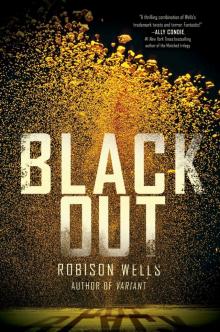 Blackout
Blackout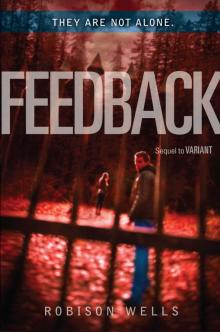 Feedback
Feedback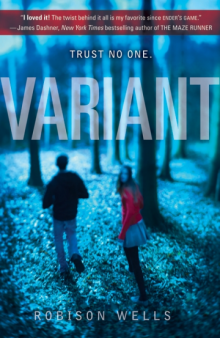 Variant
Variant Dark Energy
Dark Energy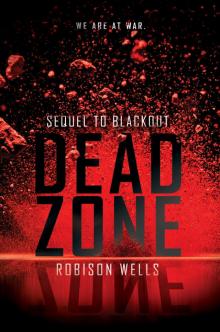 Dead Zone
Dead Zone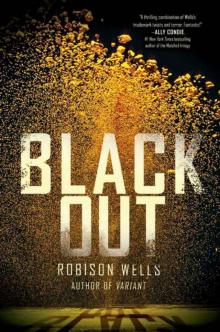 Blackout b-1
Blackout b-1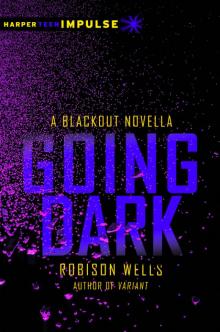 Going Dark
Going Dark